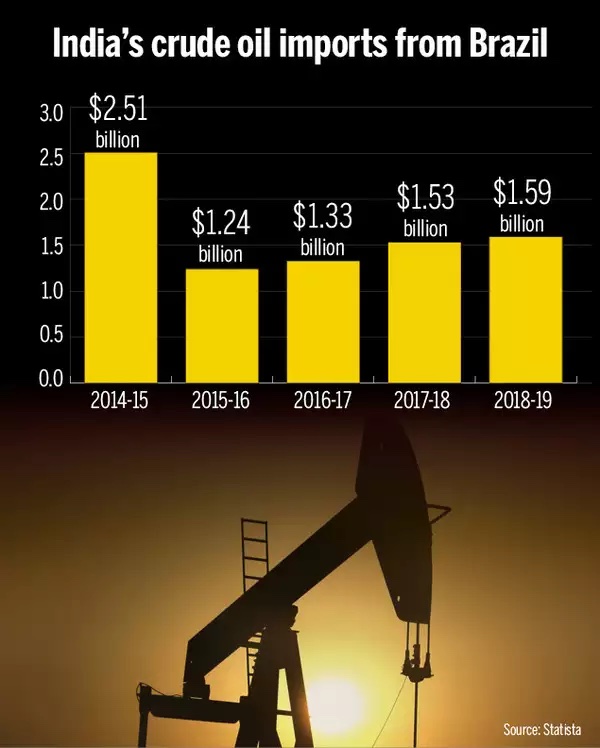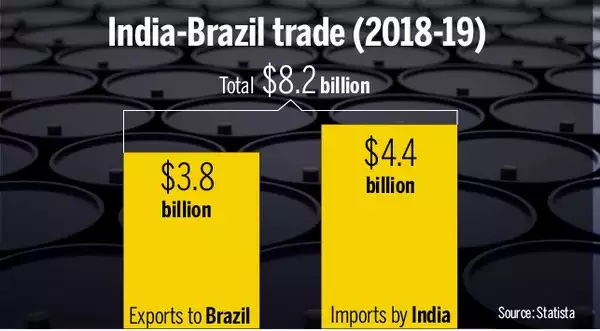Brazil-India relations
This is a collection of articles archived for the excellence of their content. |
Contents |
A backgrounder
Some salient facts
July 6, 2025:The Indian Express
Here are some key things to know about the India-Brazil bilateral relationship.
1. Despite the distance, the countries have had contact since colonial times.
A Portuguese explorer, Pedro Alvares Cabral, landed on the East Coast of Brazil in 1500, two years after Vasco de Gama had landed in India. Cabral’s visit would mark the beginning of more than three centuries of colonial rule in Brazil, while the Portuguese rule in Goa would last for more than 450 years.
Being outposts of the Portuguese imperialist empire, Goa and Brazil had trade exchanges and cultural similarities. During this period, coconut and mango crops arrived in Brazil from India for the first time, while Brazil sent cashew nuts here. Apart from this, Indian cattle breeds were also exported to Brazil, which has now formed over 80% of the country’s livestock, known as ‘Nelore’ locally (after Nellore in Andhra Pradesh).
2. Brazil is India’s largest trading partner in South America. Modern-day diplomatic ties between India and Brazil were established in 1948, soon after India gained independence in 1947. In 1961, Brazil opposed India’s ‘Operation Vijay’ that liberated Goa from Portuguese rule, and Indo-Brazil relations did not flourish for many decades.
However, in the 1990s, both India and Brazil undertook economic reforms, following which, the trade relations between the two countries expanded. According to the MEA, in 2024-25, bilateral trade reached $12.20 billion, with Indian exports to Brazil amounting to $6.77 billion and imports from Brazil totalling $5.43 billion.
Major Indian exports to Brazil include processed petroleum products (diesel), agrochemicals (insecticides, fungicides), chemicals, pharmaceuticals, engineering products, textured filament yarn, and unwrought aluminium. Brazilian exports to India included crude oil, soya oil, gold (non-monetary), raw sugar, cotton, gum, wood and turpentine oils, chemicals (carboxylic acids) and iron ore and concentrates.
Today, about 4,000 Indians live in Brazil. Most major Indian IT and pharmaceutical companies have their offices in São Paulo. Additionally, companies like the Aditya Birla Group and Sterlite have offices in the country.
3. India and Brazil were on upward economic trajectories in the 2000s.
As strategic partners, India and Brazil have several institutional mechanisms to coordinate various aspects of their bilateral relationship. This includes the Joint Commission Meeting (JCM at Foreign Minister level) and the Strategic Dialogue (between National Security Advisers). A 2+2 Political-Military dialogue was initiated, which had its first meeting in 2024.
Both Brazil and India are members of plurinational forums like BRICS, G-20, G-4, International Solar Alliance, and Biofuture Platform. In recent years, both emerging economies have sought greater space for the Global South nations on the world stage.
However, Brazil’s GDP growth rates have slowed in the last decade or so, with several state corruption scandals emerging. In 2017, Brazil’s Senate voted to remove then-President Dilma Rousseff from office for manipulating the budget, removing her left-wing Workers’ Party from power after 13 years.
Even before her ouster, she was massively unpopular owing to rising inflation and unemployment, as well as a major corruption scandal at state-run oil giant Petrobras. It came just a few months before Rio was scheduled to host the 2016 Olympics, which marked the first time the games were held in South America.
Relations, as in 2020
January 24, 2020: The Times of India

From: January 24, 2020: The Times of India

From: January 24, 2020: The Times of India

From: January 24, 2020: The Times of India
NEW DELHI: India's Republic Day chief guest this year is Brazil President Jair Messias Bolsonaro, who arrives in new Delhi for a four-day visit January 24-28. Bolsonaro had agreed to this visit last November when PM Narendra Modi had met him at the BRICS Summit.
He will be the third Brazilian president to serve as chief guest on Republic Day, after Fernando Henrique Cardoso in 1996 and Luiz Inacio Lula da Silva in 2004.
Why Brazil
This is the first visit to India for Bolsonaro, a former army captain, after he won a landslide victory in Brazil's presidential election in October 2018 and officially took over the leadership of the country in January last year. Both countries have been hit by slowdowns and Bolsonaro's visit will help boost trade ties, especially in the fields of energy, agriculture and defence.
India and Brazil are members of several multilateral fora, such as BRICS, IBSA, G-20 and G-4. Moreover, the invite to Bolsonaro came after he announced last year that Indians will be allowed visa-free travel to Brazil.
The South American country's importance has also gone up due to the requirement of crude oil by India — especially after Venezuela, which was India's fourth largest supplier, came under US sanctions, along with Iran. India's crude oil imports from Brazil have been on the rise once again, after a drastic fall in 2015-16, when India imported $1.24 billion worth of crude oil — a decline of almost 51% from the $2.51 billion worth of crude oil imported in 2014-15. In 2018-19, India's crude oil imports from Brazil were close to $1.6 billion.
Brazil wants India to cut its import taxes on chicken and chicken products, so it can cash in on India's increasing demand for poultry and poultry products as incomes rise and food habits change. India imposes a 100% import tax on chicken products and a 30% duty on whole chickens, too high for countries such as Brazil and the United States to gain a foothold in the market, where the poultry industry is growing at more than 10% a year.
Overall, bilateral trade between the two countries amounted to $8.2 billion in 2018-19, which included $3.8 billion worth of Indian exports to Brazil and $4.4 billion as imports by India. Both sides, however, feel there is huge potential to enhance bilateral trade further and Bolsonaro being accompanied by eight ministers and a delegation of business leaders is a sign that improving business between India and Brazil is a key focus of this visit. Fifteen agreements are expected to be signed between Brazil and India -- that includes deals with the government and with institutions. Major Indian exports to Brazil include agro-chemicals, synthetic yarns, auto components and parts, pharmaceuticals and petroleum products. Brazilian exports to India include crude oil, gold, vegetable oil, sugar and bulk mineral and ores.
Indian investments in Brazil were around $6 billion in 2018 while Brazilian investments in India were approximately $1 billion. Brazilian investments in India are mainly in automobiles, IT, mining, energy and biofuels sectors. India has invested in Brazil's IT, pharmaceutical, energy, agri-business, mining and engineering sectors.
Who's not happy
India’s sugarcane farmers who have taken exception to Brazil's stance against India at the WTO regarding the prices paid by the Centre to sugarcane farmers. Brazil, which is the world's largest sugarcane producer — India being the second largest — contends that India's support prices for its sugarcane farmers, as also its export subsidy, is far in excess of the permissible limits under the WTO. Then again, Bolsonaro's own reputation as a person with far-right views, including sexist and homophobic slurs, have led many to question the Indian government's decision to invite him as chief guest for India's grand military and cultural pageant.
History of bilateral ties
India's diplomatic ties with Brazil go back as far as 1948 when India opened an embassy in Rio De Janeiro on May 3, 1948. The embassy later moved to Brasilia on August 1, 1971.
Decolonisation of Portuguese colonies in India, particularly Goa, was a contentious issue between both sides. Brazil supported Portugal's claim for Goa, and in 1961, opposed India's 'Operation Vijay' that freed Goa from Portuguese rule. Former Brazilian President Juscelino Kubitschek at the time stated to then Prime Minister Jawaharlal Nehru that "Seventy Million Brazilians could never understand, nor accept, an act of violence against Goa." Eventually though, Brazil changed tack.
Recent relations
Brazil and India have co-operated on issues such as international trade and development, environment, reform of the UN and UN Security Council expansion. Both countries are strong contenders for permanent membership of the UN Security Council. In 2006, bilateral relations were elevated to a strategic partnership, heralding a new phase in the relationship between the two countries. A plan of action for this strategic partnership is expected to be launched during the visit.
In the last few years, India-Brazil ties have been on an upswing. In 2016, then Brazil President Michel Temer visited India in October 2016 on the sidelines of the eighth BRICS summit in Goa. Prime Minister Narendra Modi visited Brazil in November 2019 to attend the XI BRICS Summit.
Geo-politically too, Brazil appears to be aligned with India. The Latin American country has not joined China’s One Belt One Road initiative.
Crime
Bribes from Brazil
Sandeep Unnithan , Bribes from Brazil , “India Today” 14/11/2016
See graphic:
Bribes from Brazil , India Today
YEAR WISE DEVELOPMENTS
2020
India, Brazil sign 15 pacts to bolster defence, trade ties
January 26, 2020: The Times of India
India, Brazil sign 15 pacts to bolster defence, trade ties
NEW DELHI: Reaffirming a strategic partnership, India and Brazil signed 15 agreements as Prime Minister Narendra Modi held talks with Brazilian President Jair Bolsonaro who will also be the chief guest at the Republic Day parade at Rajpath.
India wants to open up its relations with Latin American countries, and Brazil could become New Delhi’s gateway to the continent. The two sides signed a joint statement and an action plan to deepen cooperation in defence and security; trade and investment; agriculture and energy; civil aviation; energy; environment; and health and innovation. They promised to work together to conclude an agreement to deal with international terrorism. The major focus was on boosting bilateral trade and investment as both the large economies have been hit by economic slowdown.
The 15 agreements cover a wide range of areas including oil and gas, mineral resources, traditional medicine, animal husbandry, bio-energy and trade and investment.
India and Brazil drew up ambitious plan to boost their stuttering economies by expanding cooperation in oil, gas and minerals sectors, and set a target of USD 15 billion in bilateral trade by 2022. “Your visit to India has opened a new chapter in ties between India and Brazil,” Modi said. Tweeting later, Modi said, “Apart from bilateral cooperation, India and Brazil are working together at various multilateral forums. We see immense synergies on various issues including the need to uproot the menace of terrorism. India and Brazil will keep working together for a better planet.”
